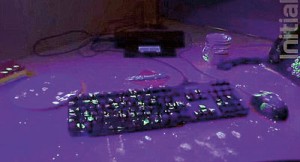Sunday Times 2
It’s time to detox your desk
Millions of us spend our days slaving over a keyboard. But lurking between the keys, hidden on the mouse and nestled in your phone lies more than 10 million bacteria – 400 times more than on the average toilet seat.
Unhygienic working conditions are a ‘key contributor’ to the 131 million working days lost each year in the UK and millions more around the world, to illnesses including colds and flu.

Pictured in green is bacteria on a desk
Bacteria and viruses can multiply on hard surfaces, remaining infectious for up to 24 hours, hygiene expert and visiting professor at the University of Salford, Dr Lisa Ackerley told MailOnline.
She said the average desk is a prime breeding ground for infections, before urging people to disinfect their desks, telephones, keyboards and computer mice.
She added that better cleaning and hygiene measures could result in ‘significantly fewer sick days’.
One in five workers fail to clean their workspace before eating, while two in three eat lunch at their desk.
Twenty per cent of people never clean their computer mouse, while around 80 per cent of common infections are transmitted by touch.
‘Our hands are a germ motorway,’ Dr Ackerley told MailOnline. ‘The slightest cough or sneeze into our hands and the germs start their journey through the office.
‘And if somebody doesn’t wash their hands the bacteria or viruses can get on your hands, even if you.’ She said if one member of the office fails to wash their hands, their colleagues can pick up their bacteria by touching the same door handles and surfaces.
Those organisms then risk being transferred when people touch their eyes or mouths, causing colds, coughs, flu, norovirus and food poisoning.
‘Any surfaces your hands come into contact with are potential breeding grounds for bacteria and viruses,’ Dr Ackerley said.
‘From the moment you touch the toilet flush and cubicle door handle, you are at risk of picking up bacteria.
‘These organisms are completely invisible. That is why it is so important everyone takes responsibility for their own personal hand hygiene. It is really important to wash your hands.’
She said a recent survey found nearly 50 per cent of office workers don’t wash their hands after going to the toilet.
‘Their refusal to wash their hands means someone else is likely to pick up that bacteria, and risk passing it into their bodies when touching their eyes, mouths or faces.
‘Cleaning in offices should really focus on any surfaces that come into contact with anyone’s hands. It is important to mop the floors, but really it is desks, sinks, handles, anywhere we put our hands – they are the surfaces that are likely to be really dirty.
Dr Ackerley said past studies have found more than 3,000 organisms per square inch on a keyboard, and more than 1,600 on a computer mouse.
She said 16 per cent of people carry norovirus, which causes vomiting and diarrhoea, but show no symptoms.
‘So you may feel perfectly fine and well, but you’re carrying around the virus and spreading it around the office,’ Dr Ackerley said
She recommended using a hand sanitiser after leaving the bathroom, and over the course of the day. And advised using anti-bacterial disinfectant sprays to clean your desk.
‘Employees should wash their hands when arriving at work, particularly if they have been on public transport.
‘Office equipment such as telephone handsets, computer keyboards and desks, which are hotspots for viruses and bacteria, and other hard surfaces in regular contact with hands should be cleaned and disinfected regularly using anti-viral and anti-bacterial products such as Dettol Disinfectant Spray which will help to reduce the risk of picking up colds and flu.’
But, she said, one of the most effective ways to stop infection is as simple as washing hands. Just 20 seconds of hand washing can stop the journey of the germ.
© Daily Mail, London

